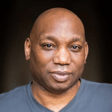
Episode 484: Rax King is Sloppy
"I am tyrannical about noise and about quiet. I don't feel that I can control the amount of mess I make. I mean, I know I can, but I kind of can't. And there's just so many things about my character that are really detrimental to having a writing process, which I need, and it's just so opposed to everything that's going on in my disgustoid little spirit," says Rax King, author of Sloppy.
As I tell Rax in this conversation, I hadn’t been reading a lot of what I’d call “fun” books. I wasn’t having much by way of fun reading for a long time and that changed with Sloppy, which isn’t to say the book doesn’t have its heavy moments, but it’s couched in a buoyant and irreverent voice that I found very appealing.
Like Melissa Febos, Rax is something of a quote machine with acerbic wit that made this episode really electric. That’s something I notice from voice-heavy memoirists and essayists. Like, if you’re not throwing heat as an essayist, you gotta work on your game. Maybe there are some who can lyric their way through, but that’s not my taste, personally. I need people pointing out the absurdities and their complicity in the absurdity. I don’t even know what that means, but it sounded good.
Rax King also is the author of Tacky: Love Letters to the Worst Culture We Have to Offer and the co-host of Low Culture Boil with Courtney Rawlings and Amber Rollo. Rax's work has been nominated for a James Beard Award and has appeared in Food & Wine, MEL Magazine, Glamour and Electric Literature. You can learn more about Rax at her website raxkingisdead.com or follow her on the gram @raxkingisdead.
We talk about revisions, her sobriety, her sloppiness, money issues, steady-income spouses and a lot of other stuff. She really brought the heat.
Newsletter: Rage Against the Algorithm
Show notes: brendanomeara.com



















